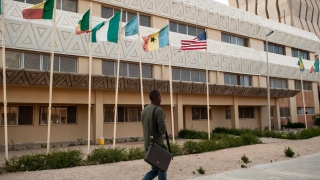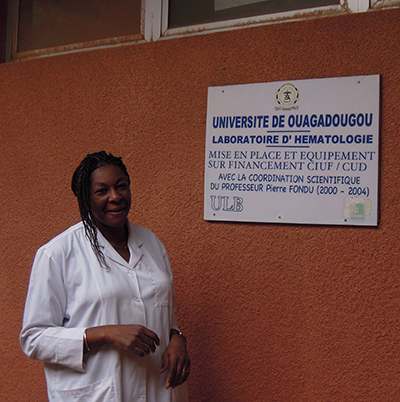Combating Sickle cell disease
— The world’s leading genetic disease —

Sickle cell disease is a serious chronic genetic affliction that is believed to affect more than 300,000 infants in sub-Saharan Africa each year. These figures motivated Fondation Pierre Fabre to join the fight against this little publicised disease in 2006.
________
Sickle-cell disease, the world’s most widespread genetic disease – particularly in Africa –, affects the haemoglobin, resulting in very painful, acute attacks and potentially fatal complications, especially in children.
Approximately 50 million people worldwide are carriers of sickle cell trait and therefore likely to transmit this genetic haemoglobin disorder to their offspring. This disease, emblematic of the populations of Africa and its diaspora, limits the life expectancy of those afflicted if they do not receive proper treatment: it is thought that half the children die before the age of five.
As a “neglected” and under-diagnosed illness, sickle-cell disease is a global health concern that is nevertheless not addressed by major international aid programmes. The Fondation Pierre Fabre has been dedicated to fighting this disease for over a decade, with several clear objectives: improve screening and treatment, train healthcare professionals and encourage research, while serving as a powerful advocate for those with sickle-cell disease to help make the illness a global health priority.
The Foundation is focusing its efforts on neonatal screening for the disease, an uncommon practice in Africa, and facilitating access to proper care. Starting with the Research Centre to combat sickle cell disease (CRLD) founded in Bamako, it intends to broadly disseminate the necessary skills for this battle elsewhere on the continent and in the Caribbean region, and forge effective South-South collaborations.
 |
 |
 |
| Prevention, diagnosis and treatment of sickle cell disease — Burkina Faso — |
Creating and developing the Research Centre to combat sickle cell disease — Mali — |
Support for the Sickle Cell Research and Treatment Centre (CRTD) — Central African Republic — |
 |
 |
 |
| Feasibility study for a sickle cell disease treatment programme — Haiti — |
Support for the Sickle Cell Disease Control Centre — Guinea — |
Supporting the fight against sickle cell disease in Sub-Saharan Africa — Cameroon, Central African Republic, Côte d’Ivoire, Democratic Republic of Congo — |
 |
 |
 |
| Support for the sickle cell treatment unit at the Centre Hospitalier Monkole — RDC — |
Supporting a programme to fight sickle cell disease — Madagascar — |
Strengthening management of sickle cell disease in Bangui — République centrafricaine — |
 |
 |
|
| Operational study on early detection and treatment of sickle cell disease — Sénégal — |
Improving healthcare and social services for those with sickle cell disease — Cameroon, Congo-Brazzaville, Madagascar, DRC — |
Follow our action
Mobile Clinics in the Central African Republic: Caring for Survivors of Violence
This unique initiative in the Central African Republic enables thousands of women to access crucial healthcare services and rebuild their lives.
Maternal health : the Fondation Pierre Fabre and Aminata Maternal Foundation are joining forces
The Fondation Pierre Fabre and Aminata Maternal Foundation are joining forces to improve maternal health in Sierra Leone, with a special focus on caring for teenage mothers.
Call for Proposals: Support for Associations in Occitania for Health in the South
The Fondation Pierre Fabre is launching its 2025 call for proposals to support associations in the Occitanie/Pyrénées-Méditerranée region working to improve access to healthcare in developing countries. Project sponsors have until 31 March 2025 to apply via the Portail Solidaire.







